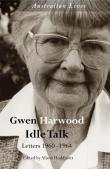AustLit
Latest Issues
AbstractHistoryArchive Description
'Idle Talk - Gwen Harwood Letters 1960-1964. This volume edited and with invaluable notes by Alison Hoddinott, comprises Gwen Harwood's fascinating, unexpurgated letters to Alison and Bill Hoddinott, during four crucial years from 1960-1964, a period which can be described as Harwood's creative floreat. They are also years in which her life-long relationships with A.D. Hope, James McAuley and Vincent Buckley begin, her friendships with Vivian and Sybille Smith and others consolidate, and in which Harwood was briefly notorious for her scandalous Bulletin acrostics and her confounding publication under several male pseudonyms.
'Approximately 10% of these letters have appeared already, in A Steady Storm of Correspondence (2001), but here we not only have the unedited versions, revealing even more than that volume, the complex and not always kind and tactful personality of Harwood (who more than once urges the Hoddinotts to 'burn these letters'), but numerous others which it might have been felt unwise to publish earlier, and from which not everyone - even Harwood herself - emerges unscathed. The collection is rich in insights not only into Harwood's mind, working methods, and circle, but also into the literary politics of one of the key periods in modern Australian poetry.' (Publication summary)
Publication Details of Only Known VersionEarliest 2 Known Versions of
Works about this Work
-
Review Short: Gwen Harwood’s Idle Talk Letters 1960-1964, Edited by Alison Hoddinott
2016
single work
review
— Appears in: Cordite Poetry Review , 1 August no. 55.0 2016;
— Review of Idle Talk : Letters 1960-1964 2015 single work correspondence -
So Long Bulletin
2016
single work
review
— Appears in: Quadrant , June vol. 60 no. 6 2016; (p. 78-81)
— Review of Idle Talk : Letters 1960-1964 2015 single work correspondence -
Advances
2016
single work
column
— Appears in: Australian Book Review , March no. 379 2016; (p. 1-2, 11) -
A Poet in the Provinces
2016
single work
review
— Appears in: Inside Story , August 2016;
— Review of Idle Talk : Letters 1960-1964 2015 single work correspondence -
Letters of a Poet in Exile
2016
single work
criticism
— Appears in: Meanjin , Summer vol. 75 no. 4 2016; (p. 16-18) 'In 1961 a woman who would soon be described condescendingly as a Hobart housewife and mother of four punctured one of Australia's most monstrous egos. Her two acrostic sonnets, written under one of the male pseudonyms that she used because of her sense of how poetry by women was undervalued in Australia, was published in the 'Bulletin'. To the petulant rage of its editor, Donald Horne, the pair of poems by 'Walter Lehmann', 'Abelard to Eloise' and 'Eloise to Abelard', had a contemporary satirical point for which the doomed medieval lovers had been enlisted. Read vertically, the initial letters of each line spelled out 'so long Bulletin' 'fuck all editors'. Harwood's first book of poetry, published by Angus and Robertson after unconscionable delays, did not appear until 1964. The Bulletin scandal is what she is perhaps still best remembered for, but her later achievements would lead Clive James at least, and gallantly, to proclaim Harwood as Australia's finest twentieth-century poet.' (Publication abstact)
-
So Long Bulletin
2016
single work
review
— Appears in: Quadrant , June vol. 60 no. 6 2016; (p. 78-81)
— Review of Idle Talk : Letters 1960-1964 2015 single work correspondence -
Review Short: Gwen Harwood’s Idle Talk Letters 1960-1964, Edited by Alison Hoddinott
2016
single work
review
— Appears in: Cordite Poetry Review , 1 August no. 55.0 2016;
— Review of Idle Talk : Letters 1960-1964 2015 single work correspondence -
A Poet in the Provinces
2016
single work
review
— Appears in: Inside Story , August 2016;
— Review of Idle Talk : Letters 1960-1964 2015 single work correspondence -
Advances
2016
single work
column
— Appears in: Australian Book Review , March no. 379 2016; (p. 1-2, 11) -
Letters of a Poet in Exile
2016
single work
criticism
— Appears in: Meanjin , Summer vol. 75 no. 4 2016; (p. 16-18) 'In 1961 a woman who would soon be described condescendingly as a Hobart housewife and mother of four punctured one of Australia's most monstrous egos. Her two acrostic sonnets, written under one of the male pseudonyms that she used because of her sense of how poetry by women was undervalued in Australia, was published in the 'Bulletin'. To the petulant rage of its editor, Donald Horne, the pair of poems by 'Walter Lehmann', 'Abelard to Eloise' and 'Eloise to Abelard', had a contemporary satirical point for which the doomed medieval lovers had been enlisted. Read vertically, the initial letters of each line spelled out 'so long Bulletin' 'fuck all editors'. Harwood's first book of poetry, published by Angus and Robertson after unconscionable delays, did not appear until 1964. The Bulletin scandal is what she is perhaps still best remembered for, but her later achievements would lead Clive James at least, and gallantly, to proclaim Harwood as Australia's finest twentieth-century poet.' (Publication abstact)




